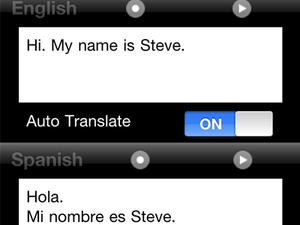In the trenchesArmy spends $50M for translation app that is already available
This year the Pentagon has set aside nearly $50 million for the development of a sophisticated smartphone translation app that would allow troops in Afghanistan to translate Pastho and Dari; but some troops have already begun using the SpeechTrans app to translate Arabic which can be downloaded on any iPhone or iPad for less than $20, and the New Jersey based company is hard at work on an Afghan language edition of its app; one defense analyst questions the need to spend millions on research when “good enough” technology is already available, especially in light of congressional efforts to cut the deficit

SpeechTrans in use on an iPhone // Source: businessinsider.com
This year the Pentagon has set aside nearly $50 million for the development of a sophisticated smartphone translation app that would allow troops in Afghanistan to translate Pastho and Dari.
But Danger Rom blogger and national security journalist Spencer Ackerman questions the need for the Army to spend millions of dollars for sophisticated technology when it is already available for a fraction of the price on the Apple Application store. In a blog post, Ackerman writes, the Army is “having a hard time saying goodbye to the expensive high-tech development projects that smartphones appear to make irrelevant.”
Some troops have already begun using the SpeechTrans app to translate Arabic which can be downloaded on any iPhone or iPad for less than $20, and the New Jersey based company is hard at work on an Afghan language edition of its app.
He is careful to point out that the translation tools that the Defense Advanced Research Projects Agency (DARPA) is developing for the military are far more sophisticated than anything currently available on the market.
For instance the Boundless Operational Language Translation (BOLT) tool is expected to be so advanced that it can translate foreign slang, while the Robust Automatic Translation of Speech (RATS) will be able to distinguish between audio that needs translation and background noise.
DARPA is also working on MADCAT, a mobile document reader that is able to translate text.
But Ackerman notes that while the technology that DARPA is developing is highly advanced, it will take several years of research before they are ready to be deployed to troops that are in urgent need of translation tools now.
With the advance of “good enough” technology and the proven effectiveness of smartphones in combat zones, Ackerman suggests that the Pentagon consider “if commercially available smartphones and tablets offer a cheaper path to the tech the Defense Department want” especially given congressional efforts to reduce the deficit.
